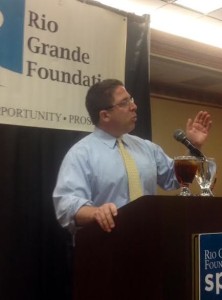Can charter schools help fix public education?

CHARTER SCHOOL CHAMPION: Rick Hess of the American Enterprise Institute believes charter schools can help improve the quality of public education in the U.S. Photo by Rob Nikolewski.
By Rob Nikolewski │ New Mexico Watchdog
ALBUQUERQUE, N.M. — The American education system is under fire for inconsistent — and often lackluster — results.
Last December, for example, U.S. students didn’t crack the top 20 in an international study of 65 countries.
In a test that’s conducted every three years by the Program for International Student Assessment, U.S. students ranked below average in math and about average in reading and science compared to other developed countries.
Rick Hess believes charter schools can help reverse that trend.
“For me, the way you take a lousy college team and turn them into a good team is not by saying, we want to go 12-0, but how do we do things better,” said Hess, a former high school social studies teacher who is now the resident scholar and director of Education Policy Studies at the American Enterprise Institute in Washington D.C.
“So rather than worry about grand progress for the U.S., my attitude is let the charters take care of their business and educate their kids well. If good charter schools expand and serve more kids, little by little they’re going to help the performance of all our children and U.S. performance will improve.”
Hess argued the public education model is outdated and broken.
“I think the big challenges to American education are, we’ve got systems that just weren’t built to educate all of our children to a high level in this century,” said Hess, who spoke to about 50 people in Albuquerque on Tuesday. “They were built around a labor force that has changed due to changes in work opportunities for professional women and the behaviors of college graduates.”
As examples, Hess cited a few statistics:
*In the 1800s, 90 percent of teachers in the United States were men
*In 1900, just 1 in 10 Americans graduated from high school
*And it wasn’t until 1970 that 90 percent of students in the country showed up for school every day
“We haven’t yet figured out how to build a system that actually works given the realities of the 21st century,” Hess said.
Hess, who also writes a blog for Education Week magazine, is a big proponent of school choice, especially charter schools, although he’s quick to say there’s no quick and easy fix.
“There’s no magic there,” he told New Mexico Watchdog after his speech at a luncheon sponsored by New Mexico’s free-market think tank, the Rio Grande Foundation.
Charter schools, which are sometimes called magnet schools, receive public funding, but they operate independently and often offer emphasis in programs such as arts or sciences.
They’re relatively new — Minnesota was the first state to pass a law creating them in 1991 — but they have their critics, especially among public school teachers unions.
One of the knocks is that charter schools don’t perform appreciably better than traditional district schools.
“I would find that (criticism) much more compelling if, A) charters weren’t spending a whole lot less per kid than district schools and if B) we didn’t see hundreds or thousands of examples of charter schools that used their autonomy to do the kinds of things for kids who need them that district schools find much more difficult to do,” said Hess, author of seven books on education, including “The Same Thing Over and Over.”
In New Mexico, the school that received the top ranking from the U.S. News and World Report was a charter school — the Albuquerque Institute of Math and Science.
On the other hand, Hess told the audience Tuesday “there are some awful charter schools.”
In just the past week, the FBI seized documents from a consortium of four charter schools in Albuquerque. The state auditor charges that two of the schools spent $1.1 million since 2008 to lease aircraft from a company owned by the school’s head administrator.
“What charter schools should do is bring out schools that are lighting it up and encourage them and get rid of those that are not lighting it up,” Hess said.
“I think the key is to rethink and reimagine how we operate and deliver schooling in the 21st century,” Hess said. “You can imagine doing this wholesale (but) it’s enormously difficult to do and so voucher and charter and tuition tax credit models and such are one important way to open the door for that kind of rethinking.”
Here are some excerpts of the New Mexico Watchdog interview with Hess:
Contact Rob Nikolewski at rnikolewski@watchdog.org and follow him on Twitter @robnikolewski







